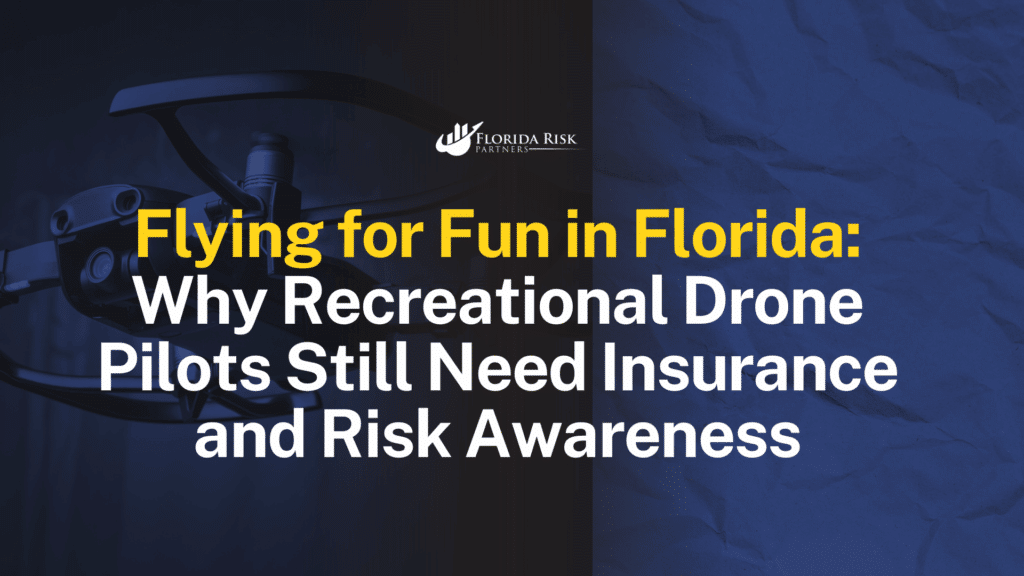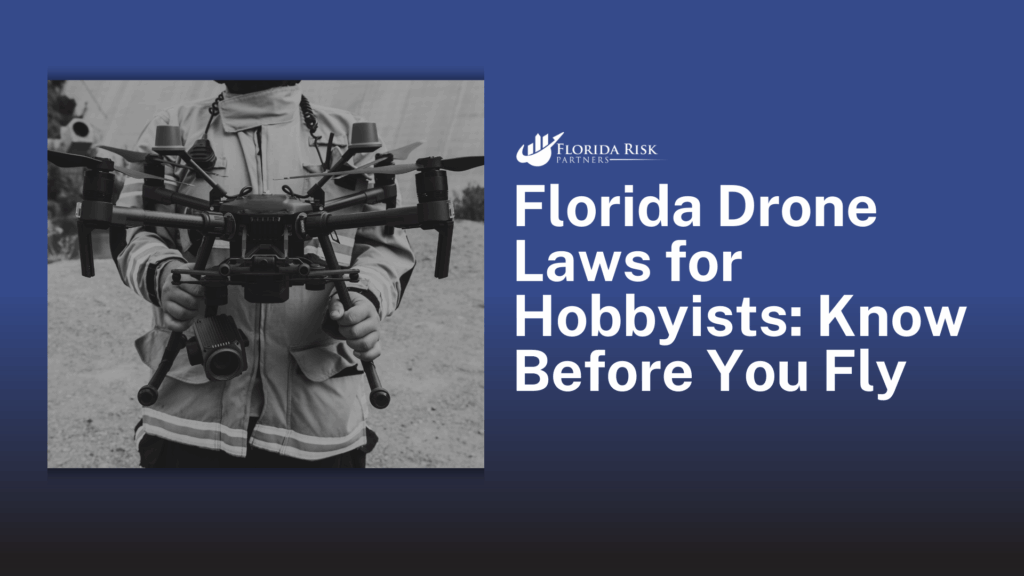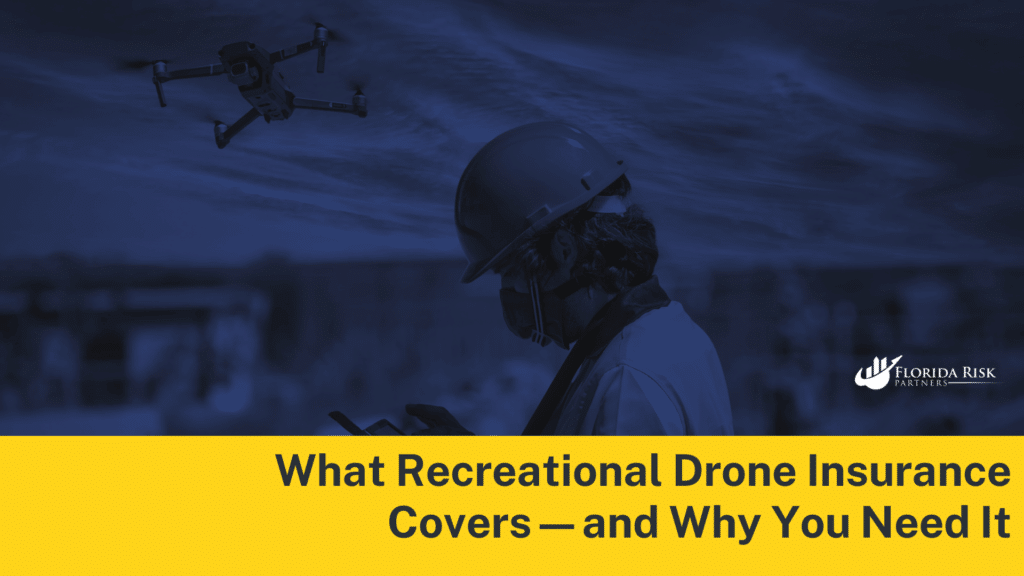-
Main Office: 1434 E. Bloomingdale Ave Valrico, FL 33596-6110
-
Phone: (888) 601-6660
-
Email: info@floridariskpartners.com

The Florida sky is an open playground for drone enthusiasts. Whether you’re filming sunset views over Clearwater Beach, capturing scenic flyovers of the Everglades, or just racing your drone through open fields in the Panhandle, flying drones recreationally in the Sunshine State can be an exciting and rewarding hobby. But as more residents and tourists embrace drone technology for fun, the risks—both legal and financial—continue to grow.
Many hobbyists are surprised to learn that even recreational drone use comes with serious responsibilities. From FAA registration to respecting Florida’s strict privacy laws, hobbyist drone operators must stay aware of their obligations—or risk facing fines, lawsuits, or property damage. That’s where recreational drone insurance in Florida becomes a critical piece of the puzzle.
This blog post dives into the world of recreational drone risk management, offering tips, insights, and guidance on how to fly safely and legally—while also exploring why UAV liability coverage for hobby use is a smart investment for anyone flying drones in Florida.
The Rise of Recreational Drone Flying in Florida
It’s no surprise that recreational drone flying has taken off in Florida. With its year-round good weather, stunning coastlines, abundant parks, and urban landscapes, the state offers countless backdrops for drone photography, FPV (first-person view) racing, and casual flights.
But the same things that make Florida a drone pilot’s dream also make it a higher-risk environment:
- High population density means you’re often flying near people, cars, or property.
- Sudden weather changes—like thunderstorms or strong coastal winds—can turn a safe flight into an emergency.
- Sensitive wildlife habitats, especially in the Everglades or along nesting beaches, pose additional no-fly risks.
- Dense airspace regulations around cities like Tampa, Orlando, Jacksonville, and Miami can create legal headaches.
Many hobbyists don’t realize that their recreational flights might take them into regulated airspace, onto private property, or near protected zones, and they often lack the insurance needed to cover accidents, injuries, or property damage.
Florida Drone Laws for Hobbyists: Know Before You Fly
Whether you’re a first-time flyer or a seasoned recreational pilot, understanding Florida drone laws for hobbyists is essential. The FAA and the state of Florida both have regulations in place to ensure safety, privacy, and responsible drone usage—even for non-commercial pilots.
Here’s what you need to know:

FAA Requirements for Recreational Drone Operators
Under the FAA’s Exception for Recreational Flyers, you must:
- Register your drone if it weighs more than 0.55 pounds (250 grams). The registration costs $5 and is valid for three years.
- Mark your drone with your registration number.
- Pass the TRUST test (The Recreational UAS Safety Test). It’s free and required for all hobbyists.
- Fly only for recreational purposes, not for payment or business.
- Fly below 400 feet AGL (above ground level) in uncontrolled (Class G) airspace.
- Get prior authorization before flying in controlled airspace using the FAA’s LAANC system.
- Keep your drone in sight at all times.
- Do not interfere with emergency response efforts or fly near airports, stadiums, or large groups of people.
Florida-Specific Drone Laws
While the FAA sets the rules for national airspace, Florida state law adds another layer, especially when it comes to privacy. The Freedom from Unwarranted Surveillance Act prohibits anyone (including hobbyists) from using drones to record images of people or private property without their consent if the subject had a reasonable expectation of privacy.
This means:
- No flying over people’s backyards or homes to take “cool shots.”
- No filming strangers on the beach without their permission.
- Even accidental footage that captures people in private settings could trigger a lawsuit.
As a hobbyist, even if your intent is innocent, you could still be on the hook for a privacy violation, which is why recreational drone liability insurance in Florida is strongly recommended.
The Hidden Risks of Recreational Drone Use
Many drone hobbyists believe that because they’re not flying commercially, their risk exposure is minimal. Unfortunately, that’s just not the case. Here are the top risks you may face as a recreational drone pilot in Florida:
1. Property Damage
It doesn’t take much for a drone to crash into a car, roof, boat, or power line—especially if you’re flying in an urban or coastal area. One gust of wind or signal loss, and you could find yourself responsible for thousands in repairs. If you’re filming near docks in St. Augustine or real estate along the Gulf Coast, even a small mistake could result in expensive property damage.
2. Bodily Injury
Recreational drones with exposed blades can cause serious injuries if they strike someone—especially children, pets, or unaware bystanders. Even if the drone never makes contact, it could distract a driver, startle someone into falling, or interfere with someone on a bicycle or skateboard.
3. Wildlife Violations
Florida is home to countless protected species, and some areas are designated no-fly zones to protect wildlife. If your drone flies too close to a nesting sea turtle, wading birds, or marine mammals, you could face fines or be reported to environmental protection authorities.
4. Unintentional Airspace Violations
Florida’s proximity to military bases, airports, and space launches makes its airspace particularly complex. Many hobbyists don’t realize that they’re flying near restricted zones, especially in areas like Cape Canaveral, Pensacola, or near MacDill Air Force Base in Tampa. Violating these airspace rules—even unintentionally—can result in FAA enforcement action.
5. Loss or Theft
Drones are valuable tech investments, and it’s not uncommon for them to be lost in dense vegetation, damaged by water, or stolen from parked vehicles or beach bags. If your drone is uninsured, replacement costs come out of your pocket.
What Recreational Drone Insurance Covers—and Why You Need It

The good news is that recreational drone insurance is widely available and affordable, especially compared to the potential costs of an incident. These policies can be tailored to the individual hobbyist and are often available on-demand through digital platforms, including right here at Florida Risk Partners.
Here’s what a standard Florida recreational drone insurance policy typically covers:
Drone Liability Insurance
This covers injuries to other people or damage to someone else’s property caused by your drone. If you accidentally fly into a parked car, cause a neighbor to trip and fall, or damage a boat while filming on the coast, liability insurance pays for the associated claims or legal defense.
Physical Damage (Hull) Coverage
This insures the drone itself against accidental damage, crash, or theft. If your drone falls into a lake or crashes during landing, this coverage helps you repair or replace the device.
Personal Injury / Privacy Liability
This coverage protects you in case you’re accused of violating someone’s privacy rights. For instance, if you fly over a backyard and accidentally record a neighbor sunbathing, this coverage can help pay legal fees or settlements if you’re sued.
Optional Add-Ons
- Payload Insurance: For drones carrying cameras or other sensitive equipment.
- In-Transit Theft Coverage: For drones damaged or stolen while being transported.
- Worldwide Coverage: For those flying on vacation or outside Florida.
The best part? Hobby drone insurance in Florida is very affordable—with policies often starting at under $100 per year for basic coverage, and scalable up to full coverage for serious enthusiasts.
Tips for Safe and Legal Recreational Drone Use in Florida
Whether you’re flying in the Keys, the Panhandle, or the Space Coast, these best practices can help keep you and your drone safe:
- Use FAA-approved apps like B4UFLY or AirMap to check airspace restrictions before you fly.
- Avoid flying near people, especially in public areas like beaches, parks, or events.
- Keep your drone in sight at all times—no flying beyond visual line of sight.
- Monitor wind conditions and weather forecasts before heading out.
- Log your flights and perform pre-flight checklists to ensure everything is working properly.
- Respect wildlife and avoid sensitive natural areas like bird sanctuaries or turtle nesting grounds.
- Never fly under the influence of alcohol or drugs.
By following these simple tips and securing proper coverage, you can enjoy your flights without fear of unexpected financial fallout.
Final Thoughts: Just Because It’s a Hobby Doesn’t Mean It’s Risk-Free
Drones offer Florida hobbyists an exciting way to explore their world, create amazing content, and enjoy the outdoors—but they also come with real risks. A fun afternoon flight could turn into a financial nightmare if you’re not properly insured or fail to follow the rules.
The bottom line? If you’re flying for fun in Florida, you still need to fly smart, fly safe, and fly insured.
At Florida Risk Partners, we make it easy for hobbyists to protect themselves with recreational drone insurance that’s affordable, flexible, and available 24/7. Because whether you’re a weekend warrior or an aerial artist, your flights deserve the same level of protection as the professionals.
Next week, we’ll discuss what drone operators need to know about insurance claims and real-world incidents in Florida—complete with examples, tips for filing, and how to make sure your policy delivers when it matters most. Until then, stay safe, stay legal, and enjoy the view from above.
Call Us Or
Schedule an Appointment
Select an agent below to view our online calendars and select a day and time that works best for you or call us directly at 888-601-6660. When you use our online calendars, you will receive an email with more information.



